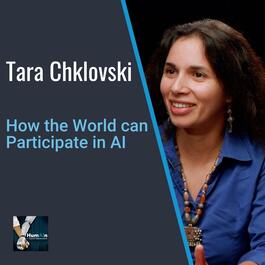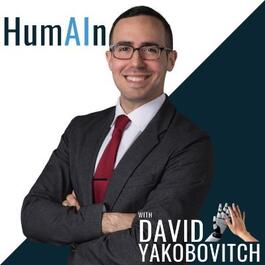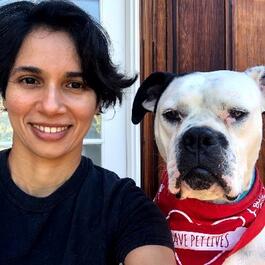
How the World can Participate in AI with Tara Chklovski
[Audio] Podcast: Play in new window | Download Subscribe: Google Podcasts | Spotify | Stitcher | TuneIn | RSS Tara Chklovski is CEO and founder of global tech education nonprofit Technovation (formerly Iridescent). Prominently featured in the award-winning documentary Codegirl, Forbes named Chklovski “the pioneer empowering the incredible tech girls of the future” and Discovery Science Channel named her its first “CEO Science Super Star Hero” for her work encouraging the next generation of innovators, problem solvers, and game changers. A frequent advocate for STEM education, she’s presented at the White House STEM Inclusion Summit, SXSW EDU, UNESCO’s Mobile Learning Week, and led the 2019 education track at the UN AI for Good Global Summit. Since founding the organization in 2006, Technovation has welcomed more than 130,000 children and parents, and 14,000 mentors, to participate in its programs in 100+ countries. Episode Links: Tara Chklovski’s LinkedIn: linkedin.com/in/iridescent Tara Chklovski’s Twitter: TaraChk Tara Chklovski’s Website: https://www.technovation.org/ Podcast Details: Podcast website: https://www.humainpodcast.com Apple Podcasts: https://podcasts.apple.com/us/podcast/humain-podcast-artificial-intelligence-data-science/id1452117009 Spotify: https://open.spotify.com/show/6tXysq5TzHXvttWtJhmRpS RSS: https://feeds.redcircle.com/99113f24-2bd1-4332-8cd0-32e0556c8bc9 YouTube Full Episodes: https://www.youtube.com/channel/UCxvclFvpPvFM9_RxcNg1rag YouTube Clips: https://www.youtube.com/channel/UCxvclFvpPvFM9_RxcNg1rag/videos Support and Social Media: – Check out the sponsors above, it’s the best way to support this podcast – Support on Patreon: https://www.patreon.com/humain/creators – Twitter: https://twitter.com/dyakobovitch – Instagram: https://www.instagram.com/humainpodcast/ – LinkedIn: https://www.linkedin.com/in/davidyakobovitch/ – Facebook: https://www.facebook.com/HumainPodcast/ – HumAIn Website Articles: https://www.humainpodcast.com/blog/ Outline: Here’s the timestamps for the episode: (00:00) – Introduction (02:32) – The AI Family Challenge is the first program for children and parents. Families can gain a better sense of how their world is being shaped by AI and in a very practical way, bond together and learn about different AI technologies (03:39) – Communities that are not empowered by technology can still have the best ideas, even without the software being at their hands. These are people that are curious about their world.They’ve heard about AI, but not in a way that is accessible or that invites them to be part of the conversation (06:32) – Encouraging the entrepreneurial mindset in these communities around the world to replicate innovation, where each individual can have a stronger voice, can have a stronger influence, a stronger sense of agency (08:06) – These communities are very similar, despite pretty large differences in socioeconomic status: very low human development indexes. But the interesting commonality is that each one of these participants are risk takers. Very few people would sign up for an AI education competition (10:00) – Over 95% of the parents think that their child is capable of creating something that's AI based in the future (12:29) – Technovation challenge is a program running for nine years across more than a hundred countries, for girls who find problems in their communities and create mobile apps to solve them. They work not with their parents, but with mentors (13:38) – Around 50% of its effort goes into collaborations with the local government, which provides some degree of support in terms of infrastructure or access to the internet, or the data is not that expensive.10% of these efforts are in countries where there's absolutely no support system (16:10) – Iridiscent’s mission is to work with groups that have typically not had access to resources and opportunities and to empower them, that they can be leaders, but using technology, which is an amplifier (16:39) – Diversity of thought is the key. Intellectual diversity and the perspectives that you bring and the training and the experience that you've had (17:57) – Hiring, retaining and attracting talent that can be intellectually at the same caliber. No matter their background, especially from other privileged countries and frontier communities. It's not about whether you're black or brown or white but how to build or develop self-driven learners (19:51) – Self-motivated learning and how you drive resilient, long-term interest in technical content (22:11) –The keys to self-motivation: exposure to someone who you respect, experience, excitement and video games, energy (28:30) – It takes a tremendous amount of effort to find these partners, to train them, to run the program on the ground, to build a sense of community and then to come back next year and to continue the momentum. This is a complex social issue with multiple factors. (29:22) – All these different countries that have gone through a common experience. And that's the power of technology. That brings people together that would never have come together. (32:35) – Ethics involves thinking deeply about the product that you're building. Developing your own self awareness. Normal human individuals who would never be product innovators and developers are now being asked to develop products that go and touch many people. (36:47) – The partnership between humans and AI needs to be a global conversation. Empowering participants to be more creative, more innovative. To support students in thinking more creatively Advertising Inquiries: https://redcircle.com/brands Privacy & Opt-Out: https://redcircle.com/privacy
From "HumAIn Podcast"




Comments
Add comment Feedback